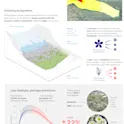
Earth science
16 Aug 2021
Secret to speediness of ancient bipedal reptile has been revealed
By Clarissa Wright, Frontiers science writer Close-up of a reptile eye, but not the ancient Eudibamus cursoris. Image Aedka Studio/Shutterstock.com The Early Permian marked a time of major seasonal changes on the planet, as reptiles rapidly diversified. A key innovation is seen in bolosaurids with the ability to run at high speeds on two legs. Scientists from California State University and Carnegie Museum of Natural History in the US and University of Toronto Mississauga, Canada, collaborated in a study recently published to Frontiers presenting the first comprehensive description of the earliest known bipedal reptile from the Early Permian – a type of bolosaurid called Eudibamus cursoris. For the first time, its unique style of locomotion that achieved high running speeds on two legs has been revealed. The Permian period (between 298.9m and 252.2m years ago) was the last period of the Paleozoic Era. The Earth was warming out of an ice age, while weather intensified. Remnants of carboniferous rainforests disappeared, replaced by open desert. Facing these environmental changes, reptiles rapidly diversified and showed remarkable innovations during the Permian. Bolosaurids are the oldest family belonging to the ancient group of extinct reptiles known as Parareptilla (or parareptiles), and are considered a […]







